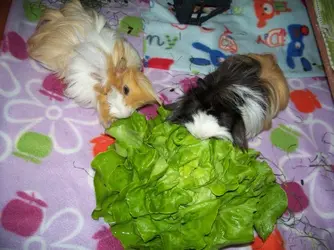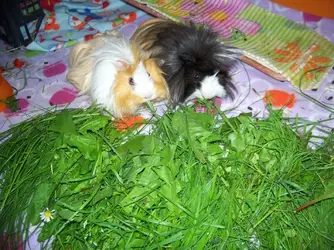Sport Billy has suggested a good guide and here you can find other guides, too. There maybe be different opinions online and among the vets, but all the vets (the updated ones) follow the rule suggested here, too; that is: 80% hay, 15% veg and 5% pellets. Pellets can be eliminated without any damage. Then there is the grass which is very important for the gut of the herbivores; if fresh grass is not available you should not replace it with too many vegs... because herbivores are not vegetarians, the gut is totally different.
Following the general rule you can choose the right menu for your piggies, considering their tastes, what you can buy at the market and always checking their poo and wee.
Another general rule is: reduce the sugars and sugars are into carrots, fruits and other vegs. And avoid the vegs and herbs rich of oxalates which can form stones.
Another main rule is the amount of the pellets, here vets are making a war against all the excess of "good" pellet dried food, the main culprit of kidney troubles in cats, dogs and roditors.
If you have lawns available (maybe during the good season) grass is very nutricious. In fact I have grass available in the park and in pedestrian areas all year round and my piggies eat only hay, grass (different kinds and wild herbs), a little slice of bell pepper, no pellets (only sometimes as a treat) and their health is very good. But if I lived in a different district this diet would not be possible...
There are good nutritional charts on the website Guinea Lynx. I would consider parsley and spinach, which are the ones with a high amount of oxalates.
Guinea Lynx ::Oxalic Acid in Selected Vegetables
this is an interesting research, it is not new, but the info are correct:
UROLITHIASIS IN RABBITS AND GUINEA
PIGS
Heidi L. Hoefer, DVM, Diplomate. ABVP
Island Exotic Veterinary Care
Huntington, NY
Rabbits and guinea pigs are susceptible to formation
of urinary tract calculi. Uroliths can be located anywhere
in the urinary tract and are typically composed of calcium
salts: calcium phosphate; calcium oxalate. (...)
Diet is likely to play a role in calculi formation.
Rabbits and guinea pigs are often fed a diet high in
calcium-rich alfalfa, and supplemented with greens rich
in calcium. Rabbits (and guinea pigs) are unique in that the amount of
calcium absorbed is directly proportional to dietary intake
and is less dependent on vitamin D. This intestinal
hyperabsorption of dietary calcium. may lead to
excessive excretion of calcium in the urine. Calcium and
oxalates are the main risk factors for stone formation in
the guinea pig. High levels of vitamin D in the diet may
increase intestinal absorption of calcium in the guinea
pig.
Foods containing high levels of oxalates must be
avoided particularly in the guinea pig,. Oxalate content is
high in dietary supplements like spinach, parsley, celery,
strawberries, and vitamin C. Vitamin C supplementation
is important in all guinea pigs and when limited to
25-100 mg/day is unlikely to result in hyperoxaluria
(it takes 8-10 grams of vitamin C per day to result in
significant hyperoxaluria in people).

